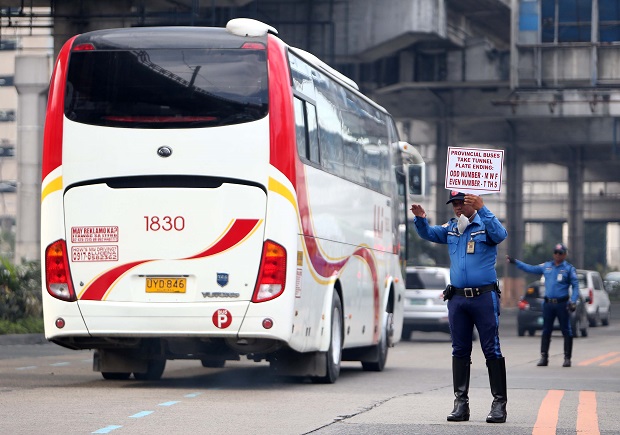MANILA, Philippines – The Supreme Court has ordered the Metropolitan Manila Development Authority (MMDA) to respond to the petitions questioning the legality of a policy banning provincial buses on Edsa.
During Tuesday’s en banc (full court) session, the high court gave MMDA through Chairman Danilo Lim and the Metro Manila Council which is composed of Metro Manila mayors, 10 days to submit its comment.
The high court also consolidated the petitions filed by AKO Bicol Reps. Ronald Ang and Alfredo Garbin Jr., Albay Rep. Joey Sarte Salceda and Bayan Muna party-list last April 29, May 27 and June 7, respectively.
However, the high court opted to defer its ruling on whether to grant a restraining order or not after the MMDA temporarily suspended its implementation.
The petitions specifically sought to strike down the assailed measure, which the MMDA and the Metro Manila Council took to ease traffic in Metro Manila’s main thoroughfare, for violating the 1987 Constitution and existing laws.
They cited the lack of “consultations with the public about the issue and should have heard the sides of the owners, bus operators and especially the passengers who will be greatly affected with the implementation of the said regulation.”
Petitioners added that the ban, in effect, is an exercise of police power by the MMDA and MMC which they don’t possess.
Petitioners added that provincial buses that travel on Edsa are less compared to city buses and private vehicles.
They cited the annual average daily traffic in 2017, which showed that an average of 367,738 vehicles traverse Edsa daily, with 67% or 247,527 of these vehicles being private motor vehicles (with 60% – 70% or an average of 148,516 to 185,645 private motor vehicles per day are single occupancy vehicles) while city buses, plying along Edsa with an average of 12,000 units daily and only around 3,300 provincial buses./ac
RELATED STORES:
Fate of provincial bus ban in SC’s hands — MMDA exec
SC asked to stop ban on provincial buses along Edsa
Edsa ban on provincial buses ‘antipoor’ — Albay solon


